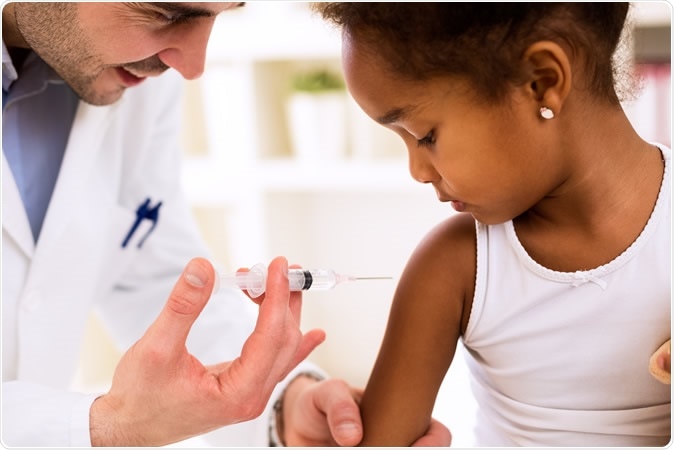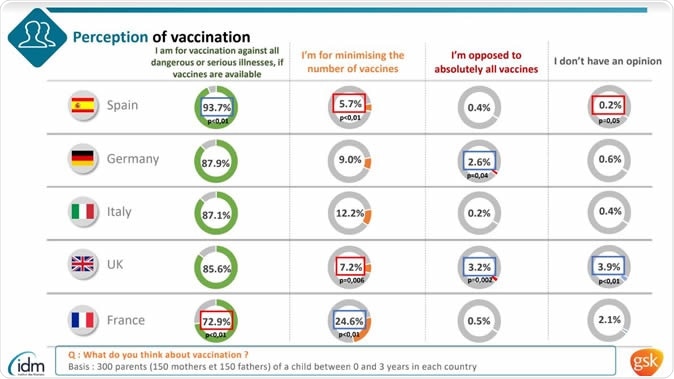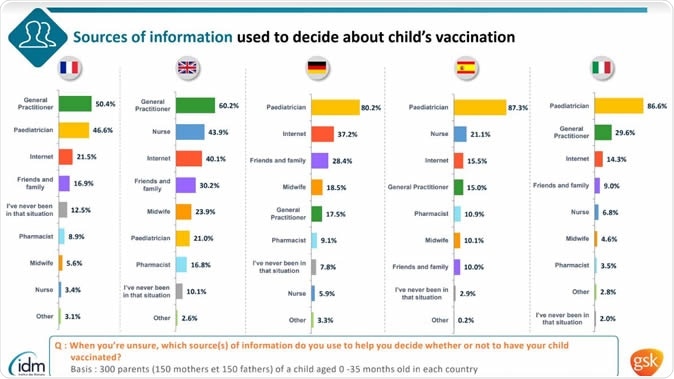Researchers in France have reported findings resulting from a web-based survey called Vaccinoscopie 2019 that asked 1,500 parents across five European countries how they feel about and what they know about vaccination.
The proportion of parents who were positive about the idea of mandatory child vaccination varied between countries. The proportion who felt less well-informed about vaccination also varied by country, with parents in France feeling the least well-informed.

Image Credit: didesign021 / Shutterstock
Vaccination coverage has fallen
Over recent years, vaccination coverage in Europe has fallen to a sub-optimal level, which has led to the resurgence of diseases such as measles and epidemics that would otherwise have been preventable by vaccines.
The main explanation for the reduced vaccination coverage is parents' hesitancy over having their child/children vaccinated.
Since Andrew Wakefield's now-discredited 1998 paper making the unsupported claim that the measles, mumps, and rubella (MMR) vaccine was linked to autism, parents across the globe became increasingly worried about vaccination. This led to to the emergence of the "anti-vax" movement, with the opinions of people who refused to be vaccinated or have their children vaccinated being echoed and amplified by social media.
Last year, the World Health Organization (WHO) listed "vaccine hesitancy" as one of the top ten threats to people's health worldwide. People in the vaccine hesitancy group are less determined in their attitudes than anti-vaxxers – leaning more towards indecisiveness and questioning rather than a complete objection. This group is, therefore, much more difficult to pinpoint, with them tending not to voice their opinions on social media and prefer to keep their thoughts to themselves due to fear of criticism. However, they represent an extremely worrying group to medical and healthcare professionals.
Last year, the Wellcome Global Monitor survey assessing 2018 data found that one in three people in France thought that vaccines are unsafe. Only half of the people living in Ukraine trusted vaccination, and in both countries, there have been outbreaks of measles recently. In the UK, the proportion of children receiving both MMR jabs by the age of five had dropped for the fourth year in a row, and in June 2018, Public Health England announced that the prevalence of measles had increased by almost four times, compared with 2017.
The Vaccinoscopie 2019 survey
Now, Alain Martinot from Lille Hospital in France and colleagues have compared parents' opinions about vaccines across five European countries, namely France, Germany, Italy, Spain, and United-Kingdom. The Vaccinoscopie survey was filled out by 1,500 people – 300 from each country – who were parents to infants aged between 0 years and 35 months.
For each country, 100 of the parents had babies aged 0-11 months, 100 had babies aged12-23 months, and 100 had infants aged 24-35 months.

The study findings
The proportion of parents who felt positive about vaccination ranged between countries, from as low as 73% in France to 94% in Spain, although the figure for Spain is still below the 95% that the WHO says is needed for sufficient protection of the population.
In the UK and Germany, 3% of the study population objected to all vaccines, while the proportion of opponents in other countries was less than 1%.
Across all countries, more than 90% were positive about the idea of mandatory vaccines against at least some diseases, although Germany and the UK had the most significant proportion of resistant individuals.
Regarding vaccination knowledge, parents in France felt they were the least well informed (only 77% felt well-informed), compared with parents in the other four countries (90 to 94% felt well-informed). Furthermore, only 58% of parents in France had consulted the internet for information, compared with 70 to 81% in other countries.

The trust in health authorities was also lowest in France, with only 68% rating their trust level at 7 to 10 out of 10, compared with 88% in other countries.
The most common information source that decisions to vaccinate were based on was a GP or pediatrician consultation (ranged by country from 50% to 87%), followed by the internet (14% to 40%, depending on the countries' healthcare systems) and friends and family (9% to 30%.)
The researchers conclude that parents approving of vaccination seemed to be associated with a better-perceived knowledge about vaccination.
"If the health care vaccinator was the first source of information, the Internet was a valuable resource and friends and families might be influential," writes the team.
Martinot and colleagues advise that in order to increase confidence in vaccination, local characteristics should be considered.
"Evaluation should be harmonized at a European level, allowing to share public health best practices strategies," concludes the team.
Sources:
Journal reference:
- Families IDM Research and Insights 2020 - Oral Presentation. Comparison of vaccine opinion of parents in 5 key European countries: learnings from Vaccinoscopie Europe, European Congress of Clinical Microbiology and Infectious Diseases (ECCMID), Jean Paul Stahl, Robert Cohen, Joel Gaudelus, Bertrand Leboucher, Damien Subtil, Patricia Pujol, Véronique Picquet, Hélène Lepetit, Laetitia Longfier, Alain Martinot